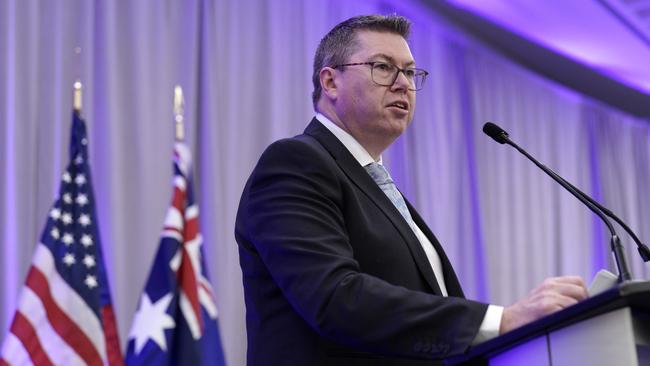Defence Minister Richard Marles urges Australian teenagers to consider careers in defence amid skills crisis
The Defence Minister has urged Australian teenagers to be patriotic and launch careers with the defence industry as Australia faces a crippling skills crisis.
SA News
Don't miss out on the headlines from SA News. Followed categories will be added to My News.
Australia is in a race against the clock to complete one of its most daring missions in history by overcoming an expansive skills gap imperilling the nation’s defensive efforts, Richard Marles has declared.
The Defence Minister has urged Australian teenagers to be patriotic by launching bold careers with the armed forces, or with an array of defence companies offering jobs at the very forefront of modern technology.
“There is absolutely a sense of pride, but also a sense of purpose in the lives that are led by those who wear our uniform,” he said.
Mr Marles said there were also “really exciting” hi-tech careers in the broader defence industry, sustaining young Australians for generations.

As Australia’s 10-year warning period for conflict has evaporated, Mr Marles hinted at the offering of closely guarded security clearances to foreign workers in a bid to accelerate the recruitment of a highly skilled workforce.
“We face the most precarious strategic circumstances that we’ve had since the end of the second World War, and getting our strategic posture right in the face of that is a huge national challenge,” Mr Marles said.
In an exclusive interview with the Sunday Mail for the launch of News Corp SA’s Defending Australia campaign, the Defence Minister cited a lack of skills as the greatest risk to the country’s defensive efforts, which include building at least eight nuclear-powered submarines in SA.
Spanning the sea, land, air and cyber domains, thousands of additional workers will be needed across the defence industry and the ADF in just this decade alone to safeguard the country from rapidly increasing geopolitical tension.
But amid a slow uptake of advanced skills, and as mining recruiters sit outside shipyards luring defence workers with cash, there is a full-blown crisis that is keeping federal government ministers “up at night”.
Proving to be one of the hardest challenges is establishing an entirely new industry to support the top-secret and extremely complex nuclear technology provided by the US under the AUKUS security pact.
“There is a task in us becoming nuclear stewards, which is what is required of us by those who will provide us with the technology – the United Kingdom and the United States – (and) the international community,” he said.
“It’s everything – it’s hardening buildings, it’s hardening the IT and cyberspace around this, it’s making sure that we have the appropriate regulation in place. There is just a huge body of work which needs to be done.
“I’m confident we’ll do it, but when you think about it in its totality, this is going to be one of the greatest national endeavours of the Australian story.”
Mr Marles did not rule out establishing a new arm of Defence devoted to nuclear technology – alluding to “new structures” to be revealed in the AUKUS review by March next year.
He and Defence Industry Minister Pat Conroy both sounded the alarm over a huge skills shortage, on which the time for action is rapidly running out.
It has sparked a major rethink of Australia’s tightly held defence security clearances, which are only available to citizens – making it difficult to attract some of the world’s best talent in defence from close allies like the US and Britain.
“Our submarine capability right now and our future nuclear-powered submarine capability will be as closely held secrets of our nation’s as any, so national security around that matters,” Mr Marles said.
“But I think it is an important conversation to be had as we look at what workforce challenges are presented to us.”
Mr Conroy said further complicating security requirements was Washington’s International Traffic in Arms Regulations, which will heavily restrict who can access the US’ nuclear-powered submarine technology in Australia.

“One thing I was talking to my counterparts in the United States is coming up with things like an AUKUS visa, where there’s a bit more flexibility for certain groups of people so that we can cut through that red tape to get the technology we need,” Mr Conroy told News Corp Australia.
Pressed on Labor’s solutions to the widening skills gap, Mr Conroy said: “It’s the thing that keeps me up at night – will we get enough skilled workers?”
“At the moment we’re facing a lot of competition with the resources sector,” he said.
“I know recruiters are sitting outside our shipyards trying to lure people into those projects.”
More Coverage
Originally published as Defence Minister Richard Marles urges Australian teenagers to consider careers in defence amid skills crisis





